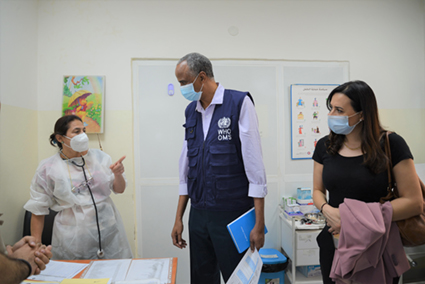With an increased number of new patients in recent weeks and months, the Amel centres offer a complete package of health services and provide medications at a reduced rate or free of charge in many cases. As Dr Mouhanna said, “What we do is huge but it is not enough to meet the demand. We work for an idea and the idea is human dignity. We are playing the role of a catalyst to give a model.”
Samar, a mother of 29 years of age with 2 children, has been visiting the Barajneh centre for the past 4 years. “I started visiting the centre when my daughter was born. I have been coming to this centre for many years, and I don’t go to any hospital. The centre has all essential health care services, including routine vaccines for the children, and I am able to go for gynaecological check-ups”.
Dr Mouhanna and his team showed Dr Abdinasir all available services and met with specialized doctors. His impression after the visit is that the primary healthcare services in Lebanon are operational and well connected to the local community. One of the important services provided by Amel in most of the centers is mental health services and we learned that more and more people are in need of psycho-social support in recent months.
Dr Abdinasir commended the work of Amel Associated and he said “I can see that the centres are well connected to the local communities in which they are serving. They are really providing essential and comprehensive health service packages to the most vulnerable population in the country. Due to the multiple crises in the last 2 years, more people are seeking health care services at PHC centres rather than going to the private sector which they can no longer afford.”
Strengthening and expanding PHC services is essential to achieve universal health coverage in general and Lebanon is making good progress, despite many challenges. WHO commends the collaboration between the Ministry of Health and civil society organizations, Amel in particular for improving access and availability to quality essential health services through a robust PHC system. WHO will continue to provide technical support to the health authorities and partners in strengthening and sustaining the PHC services among a vulnerable population in the country.









